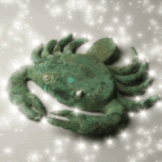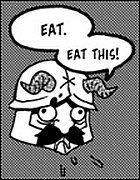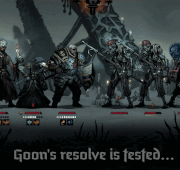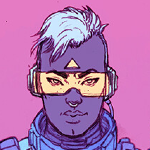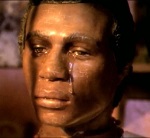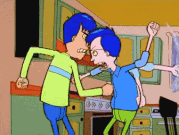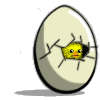|
Describing weather briefly is fine, but you shouldn't begin that way unless you're an established author.
|
|
|
|

|
| # ? May 14, 2024 21:00 |
|
Twas a dark and stormy night. Mine nuncle, Ser Richard, was feasting upon a subtlety in that downpour, the sweet green icing running down upon him. "I shall never have this recipe again," he spake.
|
|
|
|
TheRamblingSoul posted:When is it appropriate to focus on describing nature or weather in a story? I've read advice saying that you should by-and-large avoid describing or writing about nature or weather since it is really cliche, but what about like with Grapes of Wrath where Steinbeck spends several pages (the first chapter?) describing the clouds passing over Oklahoma before getting to the Joad family? Write it, then cut it and see if the story still works.
|
|
|
|
Q: I'm writing a story in past tense, but there is about a page where the narrator is reflecting on a previous event in past-perfect tense (like, "he had waited" instead of "he waited"). I think it's really awkward to write in past-perfect the whole time, so I tend to drop in "had" maybe once or twice per paragraph, just to remind the reader. Otherwise it's mostly in regular past tense. This feels like the right way to do things, but I was curious what other people thought.
|
|
|
|
Sitting Here posted:Q: I'm writing a story in past tense, but there is about a page where the narrator is reflecting on a previous event in past-perfect tense (like, "he had waited" instead of "he waited"). maybe post a slab? it'll be easier to tell how it reads.
|
|
|
|
TheRamblingSoul posted:When is it appropriate to focus on describing nature or weather in a story? I've read advice saying that you should by-and-large avoid describing or writing about nature or weather since it is really cliche, but what about like with Grapes of Wrath where Steinbeck spends several pages (the first chapter?) describing the clouds passing over Oklahoma before getting to the Joad family? A long time ago, authors included a lot of description of seemingly mundane settings in their work simply because books were a cheap form of travel. Most of Steinbeck's readers wouldn't have ever been to Oklahoma, and so a detailed description would have been fascinating to them. Usually the older a book is, the 'worse' it is in this regard. Today the world is smaller and this no longer applies. People travel more, and in addition can quickly and easily look up a picture of Oklahoma if they're really curious to see what it looks like. (Which I can't ever imagine happening in this case, but y'know) People today know what rain looks like, what clouds look like, and what jungles and cities and deserts and faraway mountains look like. Everyone's advice is spot-on: try to include only information that tells the reader something interesting about either the world itself or, more importantly, how a character sees it. If your book takes place in a truly unique scifi/fantasy setting, then you'll naturally need to give more detail about it--but the rule still applies. Green mountains with purple snow are not that much more interesting than regular mountains with regular snow. Sitting Here posted:Q: I'm writing a story in past tense, but there is about a page where the narrator is reflecting on a previous event in past-perfect tense (like, "he had waited" instead of "he waited"). Without seeing an example, I can't really imagine another way to do it. Sometimes you can soften the ear-fatigue brought on by 'had' by using contractions i.e. "He'd gone to the store; they'd been arguing" etc. Chillmatic fucked around with this message at 00:47 on Sep 9, 2014 |
|
|
|
Liam Emsa posted:I don't know. I just feel like I don't spend enough time painting the scene. If I do, I feel like I'm forcing myself to do it, and then adding unnecessary fluff detail. I have a screenwriting background, so I often feel like I'm painting it like a movie scene, and I don't know if that's good enough or not. quote:INT: HOSPITAL CORRIDOR, NIGHT ... Do the same with your descriptions: quote:It was dark in the hospital corridor. Start general and then get specific. I would limit the description to a paragraph - any more than that and IMHO you should describe things in terms of what a character thinks of / relates to it to keep it interesting. Honestly, the majority of readers know what a hospital corridor looks like. Your main job is to then define what details they need to get the scene right so that when a character jumps out of a side door knocking them into a shelf, they don't think "wait, what door / shelf?"
|
|
|
|
Mkay. The context is that my crazyass narrator is looking back on how he met Sarah. I'd post a longer chunk, but we'll get bogged down with all the other problems it has  I just want to know if this feels like it's happening in past-perfect tense, or if I need to up the 'had's. ... And so Iíd sat in an old booth with ripped cushions and stared into my coffee. My mind was a fractured thing, two people hideously stitched together in one body. I was two people, and I was no one. Cold air had rustled the napkins on the tables as someone came in through the front door. My reflection in the coffee mug trembled a little as the newcomer sat down in the booth next to mine. Iíd looked up, then immediately back down at my coffee. Sarah Drewen was sitting so that she faced me, two tables and two booth seats between us. She waved at the waitress, then pulled out her phone and began to fiddle with it. She hadnít noticed me, and why would she? She had no idea Iíd been watching her leave her office.
|
|
|
|
reads good to me. i like when people do that. i hate the had had had had had all the time. like as long as it's not confusing, which it isn't, then it's fine in my book. IANAE
|
|
|
|
Sitting Here posted:Mkay. The context is that my crazyass narrator is looking back on how he met Sarah. I'd post a longer chunk, but we'll get bogged down with all the other problems it has Yeah, that works p okay; it's not elegant, but it's clear enough what you're doing. Maybe even cut the past perfect apart from the first one? so you set the scene, then jump back into the past. it's mildly jarring to keep dropping in the 'had's; is it that important?
|
|
|
|
sebmojo posted:Yeah, that works p okay; it's not elegant, but it's clear enough what you're doing. That was my initial thought, but it made me worry that a reader (lol) would forget that the narrator is looking back on a previous event. I'm not TOO hung up on it. Just one of those things where I've been staring at the same bit for too long, maybe!
|
|
|
|
blue squares posted:Describing weather briefly is fine, but you shouldn't begin that way unless you're an established author. What's wrong exactly with beginning a story with weather besides screaming cliched and turning off readers immediately? Is it just about bad first impressions and not trusting the author's storytelling ability or something more? Teriyaki Koinku fucked around with this message at 01:29 on Sep 9, 2014 |
|
|
|
TheRamblingSoul posted:What's wrong exactly with beginning a story with weather besides screaming cliched and turning off readers immediately? Is it just about bad first impressions and not trusting the author's storytelling ability or something more? do you need anything more?
|
|
|
|
sebmojo posted:do you need anything more? Eh, I guess not. Point taken.
|
|
|
|
It's like most* rules of writing. It's there so that if you do decide your story is best served by opening with a weather report, it's only after you've thought about it and agonized about it and looked for another, better way of doing it, and even then, you're probably wrong because there probably was a better way to do it. ___ *Not the one about said-bookisms. People come 'round to your house if you use more than your lifetime limit, he said quietl OH SHI
|
|
|
|
docbeard posted:It's like most* rules of writing. It's there so that if you do decide your story is best served by opening with a weather report, it's only after you've thought about it and agonized about it and looked for another, better way of doing it, and even then, you're probably wrong because there probably was a better way to do it. Every single 'rule' is there as a flag, and the simplest way is always to cut the flagged thing and see if what you're saying still works and makes sense. If it doesn't, then you can either put it back or find a different way to say it. I think of weather as like throat clearing before the story starts; why not just start the story and clear your throat on your own time, not the reader's? sebmojo fucked around with this message at 02:07 on Sep 9, 2014 |
|
|
|
One of the books I read had used present tense for flashbacks, with the text italicized. Sort of like the main character reliving the memory at that point in the present narrative (which was written past tense). It kind of works, and I've used it in one of my stories before, but you need an ear for it. re: opening with weather I think of it as small talk written down--the writer is easing the reader into the story. However, the amount of stories in this last few decades have swelled up so much that readers don't have the attention spans to put up with this anymore. Just get to the point, or I'll find another story that will, is the prevailing thought.
|
|
|
|
the other thing is like, if you describe weather, you can do it in an important sentence with about three extra words and then its in the readers head without going "hey, hey yo, its raining". "the smell of garbage overwhelmed that of freshly wet grass" "he raised his hand above his forehead to block both sun and strike" blah blah those are terrible xamples but how i would squeeze it in if you need it as an early detail but without boring me. anime was right fucked around with this message at 02:45 on Sep 9, 2014 |
|
|
|
If I want to devote a chapter to giving a historical background of a company, is that something I do in present tense? I know that this is probably a really bad idea, but I was just wondering. I'm thinking of something like Moby Dick, where he devoted certain chapters to historical background or explanation of topics. Something like: quote:Vandelay Industries is a cybernetics company that was founded in 2047. Currently owned by Lord Vader, it specializes in high-tech dildonics for the military age. It employs over 3 billion people.
|
|
|
|
Liam Emsa posted:If I want to devote a chapter to giving a historical background of a company, is that something I do in present tense? I'd say it's something you do in NEVER tense. I mean, maybe not never. But that's boring as hell. I'm not gonna read a chapter of historical background unless it's full of gang fights and murder.
|
|
|
|
Liam Emsa posted:If I want to devote a chapter to giving a historical background of a company, is that something I do in present tense? Does this historical background--not the company's existence, but its background--matter to your characters? Was one of your characters there for it? Do they work there? Do they have any ties to the company at all other than "the company is an entity in the story"? If the answer to these questions is no, I would think twice about devoting a whole chapter to the company's background. Even if the answer is yes, a whole chapter of background on the company sounds pretty tedious unless the background itself is absolutely vital to the story. And even then, I'd probably just sprinkle bits and pieces of it into the narrative itself.
|
|
|
|
weather report: Combine it with something interesting, something that tells us about the character or the setting. Like having rain glistening on the head of a spear, or soaking the shirt of a girl as she runs home, the sound of footfalls close behind. Or wind blowing litter down an empty alley. Make the weather part of the setting. company history: If you've got masses of backstory, add it as an appendix and just refer to key events in the text. Have characters recount details to each other while doing something else. Example: quote:"We've got less than a minute before the system goes off! Give me the goddamn code!" Caveat: Never have a character explaining something to another character that they should already know. Having that character forget a name or a date and have to be prompted is fine. Having them forget what their company does or needing an aspect of their military training explained to them, not so much. TLDR: If you feel you have to include a boring detail in your story, combine it with something interesting.
|
|
|
|
Bobby Deluxe posted:
|
|
|
|
Weird question, but has anyone thought about what name you should use when publishing? Stephen King could have been Steve King or even Stephen Edwin King. Have any of you gone through this? What made you choose one over another?
|
|
|
|
I was gonna use Stephen King too, it worked out really well for Stephen King
|
|
|
|
I use my legal real name for sportswriting but I've contemplated using a different name for my self-published Amazon velociraptor erotica. Mostly I just think the hockey crowd wouldn't get it.
|
|
|
|
im pretty sure id need to get a book published before i eve thought about that
|
|
|
|
All self-published work should be written under the name Stephen King irrespective of author, genre, quality or sexiness of velociraptor homoerotica.
|
|
|
|
Anomalous Blowout posted:I use my legal real name for sportswriting but I've contemplated using a different name for my self-published Amazon velociraptor erotica. Mostly I just think the hockey crowd wouldn't get it. Tal O. N. McThrust?
|
|
|
|
Liam Emsa posted:Have any of you gone through this? What made you choose one over another?
|
|
|
|
My pseud is Robert E.O. Speedwagon. It's pretty unique, I doubt Google or Amazon will confuse me with anyone else.
|
|
|
|
Is Fictive motion just a fancy (and actually useful) phrase for "show" or do they contrast somehow? (Kind of like how said is preferred over "slurred", "huffed" et etc)
|
|
|
|
Fictive motion is a fancy phrase for a specific device. (For those that don't want to Wikipedia it, it's when you give motion to something that doesn't move, such as 'the stairs run to the top of the building'.) It can be a way of 'showing', but it seems like mainly just a linguistic device like synecdoche (using a part of something to refer to the whole) as opposed to a style choice.
|
|
|
|
I'm trying to write about the main character having a vision of an alternate reality that he can see alongside the reality he's in currently. I feel like I'm doing a poor job of describing his first interaction with it. He is waking up in a hospital and it occurs when he tries to get a glass of water:quote:He reached for the glass of water on the table next to his bed. At the moment he reached out, he noticed two right arms reaching out of his body. The sight shocked him, and he pulled back. He slowly reached again. The second arm moved out again. He watched it carefully. It didnít appear to be attached to his body in any realistic way. He didnít feel it. It extended from the exact same location on his shoulder that his real arm extended from. But it was different. It appeared to be reaching for the same glass, but different. It was reaching in a different way. Slightly lower, as if it was just making a separate, second attempt for the glass. He pulled back once more in trepidation. He looked closely at his hand. It looked just like the view outside, slightly doubled, as if a ghost image was following itís every move. Maybe this was some visual side-effect of the his medication. Regardless, he needed a drink. He reached for the glass. The ghost image of his arm again went out separately. He ignored it this time. He grabbed the glass firmly with his fingers. The second arm reached the glass at the same time, only this ghost image knocked into it callously. A separate, ghost glass fell to the floor with a loud crash, shattering and spreading water across the floor of the room. Then, in an instant, it was all gone. The floor was clean. The glass was gone, and the arm had disappeared. He was left holding his glass in his hand.
|
|
|
|
Liam Emsa posted:I'm trying to write about the main character having a vision of an alternate reality that he can see alongside the reality he's in currently. I feel like I'm doing a poor job of describing his first interaction with it. He is waking up in a hospital and it occurs when he tries to get a glass of water: yeah, that's pretty bad. you need to show when you tell. you need to strip out a billion adverbs. You just say "oh, it's DIFFERENT." No, don't do that. Describe it better.
|
|
|
|
Liam Emsa posted:I'm trying to write about the main character having a vision of an alternate reality that he can see alongside the reality he's in currently. I feel like I'm doing a poor job of describing his first interaction with it. He is waking up in a hospital and it occurs when he tries to get a glass of water: Hullo. I love writing dreamy, surreal bullshit. And there are a few things I've learned thanks to helpful critiques from people on this very forum. -You have to be really, really clear. Almost painstakingly clear. You can't just say what something isn't. You can see it in your head. The reader can't. -It's best to build up to the realization that something alternate realityish is happening. Like I commented in bold above, I would've started by having the character assume he is having double vision. But there're all sorts of ways you can do it. Maybe you already have, and this is the culmination of that buildup, but I don't feel that at all from the character's reaction. -Your character is weirdly pragmatic in this scene. He has this weirdass ghost arm, and he's still like "must drink water". He's experiencing something that is either A) some kind of hallucination/delusion, or B) something out of the ordinary. Think of how you might feel if you've taken a strong cold medicine or sleep aid. Experiencing something fundamentally impossible, like suddenly having an extra arm, is going to be upsetting, jarring, and viscerally wrong-feeling. And in this case it's an alternate reality, which our brains are not really meant to perceive, I would assume. I know if I were in this guy's situation I would be like, "what the hell is wrong with me," possibly while mashing the button that calls the nurse. I'm picking on this so hard because I suspect this story is riddled with the same adverb problems. I'm also guessing you use phrases like he noticed/he felt/he saw/he suddenly _______/etc a lot. I'm also also guessing you do too much telling about how the narrator feels. He was shocked, he was afraid, he was confused, he did _______ with trepidation, and so on. Basically, the vaguer your subject matter, the more precise your prose have to be. Describe your protagonist's experiences in painstaking detail first, then add in flare. Build the scene for your reader, starting from things that are relatable (the sensation of having double vision from a medication or injury) and building up to the incredible (a ghost arm that juts out of your body from an impossible angle).
|
|
|
|
If you are John Steinbeck you can do whatever the gently caress you want.
|
|
|
|
Sylink posted:If you are John Steinbeck you can do whatever the gently caress you want.
|
|
|
|
General Battuta posted:The really super great thing about a story/book is that it only takes one person to create. Anyone who's been involved in production for a movie or video game, no matter how small, knows what an advantage that can be. I made it to the second round of the current F&SF slush and I may or may not be in the next issue of Lamplight, but that's about it.
|
|
|
|

|
| # ? May 14, 2024 21:00 |
|
Reach Reacher, Reaching Differently (Yet Just Out of Reach) And Slightly Lower
|
|
|










